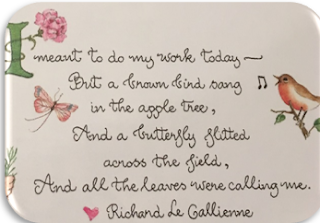When I was
in high school, Lucy, a girl a couple of grades ahead of me, seemed to be a
“misfit.” She looked “different,” though I could not say how. She had no
friends. My friends were not in study hall with me, so I sat across the table
from Lucy. We made small talk as much as allowed, and mostly just studied. Lucy
had a problem, but I didn’t know what it was.
One day,
with my head down over my book, I heard a small commotion in front of me. I
looked up to see the study hall teacher, a sturdy man, behind Lucy with his
arms around her in a tight bear hug. I saw Lucy’s eyes roll back in her head.
Teacher and student trembled and thrashed violently for a few moments, the
teacher struggling valiantly to hold on to her. Shortly she went limp, then
took a long breath. Teacher asked, “You OK?” She nodded and he went back to his
desk.
I was
stunned. I had not known Lucy was prone to violent seizures. But it was just
“normal” for her; the teacher didn’t even send her to the nurse.
We have
songs with words like, “Be Jesus to someone today,” or “I will be Christ to
you.” How do we do that? It must be something more than just, “Be nice.”
The teacher
knew what the problem was; I wasn’t even aware of it. He knew the symptoms; I
didn’t even see it happening right in front of me. He knew what to do about it;
I did nothing. He stepped in and rescued her from the power of her illness and
the consequences of it. Had he not intervened, the seizure would certainly have
caused her to injure herself. He took a bit of a risk that she would hurt him.
I’m sure that was not as great a concern to him as the possibility that his
help would fail and she would be hurt in spite of his efforts. He was like
Jesus to her; I was just a nice bystander.
All those
things Jesus knew about us -- the problem, the symptoms, what to do. And he had
the physical and moral strength to do what was necessary. We were suffering
from something worse than seizures – he called it death. He stepped in and
rescued us far more dramatically than our teacher rescued Lucy.
We can’t “be
Jesus” and save people’s souls, but we can help because the Bible tells us the
problem, the symptoms and the solution. If we remember the depth of the grace
and forgiveness that God gives us, we will want that for
everyone. Can we put our arms around someone and offer rescue from the worst
malady – eternal death?
--Lynda Shenefield


